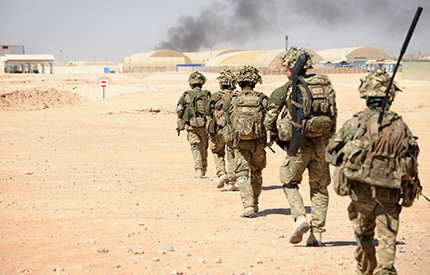Increase in probable PTSD among British military

New research from King’s College London suggests the conflicts in Iraq and Afghanistan may have led to an increase in the rate of probable Post Traumatic Stress Disorder (PTSD) among members of the UK Armed Forces.
The results, published in the British Journal of Psychiatry today, estimate the overall rate of probable PTSD among current and ex-serving military personnel to be 6% in 2014/16, compared to 4% in 2004/6. The study also found the rate of alcohol misuse has fallen from 15% in 2004/6 to 10% in 2014/16.
Large scale studies rule out individual clinical assessments for PTSD, therefore participants were considered to have probable PTSD if they scored 50 or more on the PTSD checklist questionnaire, in line with international research standards.
The higher rates of probable PTSD is primarily seen among ex-serving personnel who deployed to Iraq and Afghanistan. Among those who deployed to the conflicts, the rate of probable PTSD for veterans was 9% compared to 5% for veterans who did not deploy. The rate of probable PTSD among currently serving personnel was also 5%, which is close to the rate of PTSD in the general population.
Lead author Dr Sharon Stevelink, from the Institute of Psychiatry, Psychology & Neuroscience (IoPPN), said: ‘For the first time we have identified that the risk of PTSD for veterans deployed in conflicts was substantially higher than the risk for those still serving. While the increase among veterans is a concern, not every veteran has been deployed and in general only about one in three would have been deployed in a combat role.’
Among ex-serving personnel who deployed in a combat role to Iraq or Afghanistan, 17% reported symptoms suggesting probable PTSD compared to 6% of those deployed in a support role such as medical, logistics, signals and aircrew.
The findings are from the third phase of a major cohort study by the King’s Centre for Military Health Research, which has been running since 2003 and is funded by the Ministry of Defence. Of 8093 participants included in the third phase of the study, 62% had deployed to Iraq or Afghanistan.
Senior author Professor Nicola Fear, from the IoPPN, said: ‘In previous phases of the study rates of probable PTSD in our military sample were broadly similar to the general population, but the rates now appear to have risen. More research is needed to explain the rise, but one possible reason PTSD is more common among veterans may be that personnel who are mentally unwell are more likely to leave the armed forces.’
The study also found that the rate of common mental disorders was raised for veterans who held a combat role, at 31% compared to the overall rate of 22%. However, the overall rate of common mental disorders had not increased compared to previous phases of the study. PTSD remains less common in the military than either alcohol misuse or common mental disorders.
Senior author Professor Sir Simon Wessely, Regius Professor of Psychiatry at King’s College London, said: ‘Our results suggest the risk of mental ill health is carried by those who have left the service, and that part of the legacy of conflicts on mental health has taken time to reveal itself. However, it would be wrong to say there is a ‘bow wave’, ‘tsunami’ or ‘time bomb’ of PTSD in the UK military and veteran community. The study supports the current focus on providing and improving mental health services for both serving personnel and veterans.’
Professor Wendy Burn, President of the Royal College of Psychiatrists said: ‘It is vital that we meet the growing demand for military and veteran mental health services so that those who serve their country can easily access care while in service and afterwards. Thankfully, more military personnel are asking for the care they need. The results of this paper highlight the vital role that military psychiatrists, both uniformed and civilian, play in safeguarding the mental health of military personnel and that working in this field can be an incredibly rewarding and exciting job.’
Paper reference
‘Mental health outcomes at the end of the British involvement in the Iraq and Afghanistan conflicts: a cohort study’ Stevelink et al, British Journal of Psychiatry, DOI: 10.1192/bjp.2018.175
Contact
For further media information please contact: Robin Bisson, Senior Press Officer, Institute of Psychiatry, Psychology & Neuroscience, King’s College London, robin.bisson@kcl.ac.uk / +44 20 7848 5377 / +44 7718 697176.